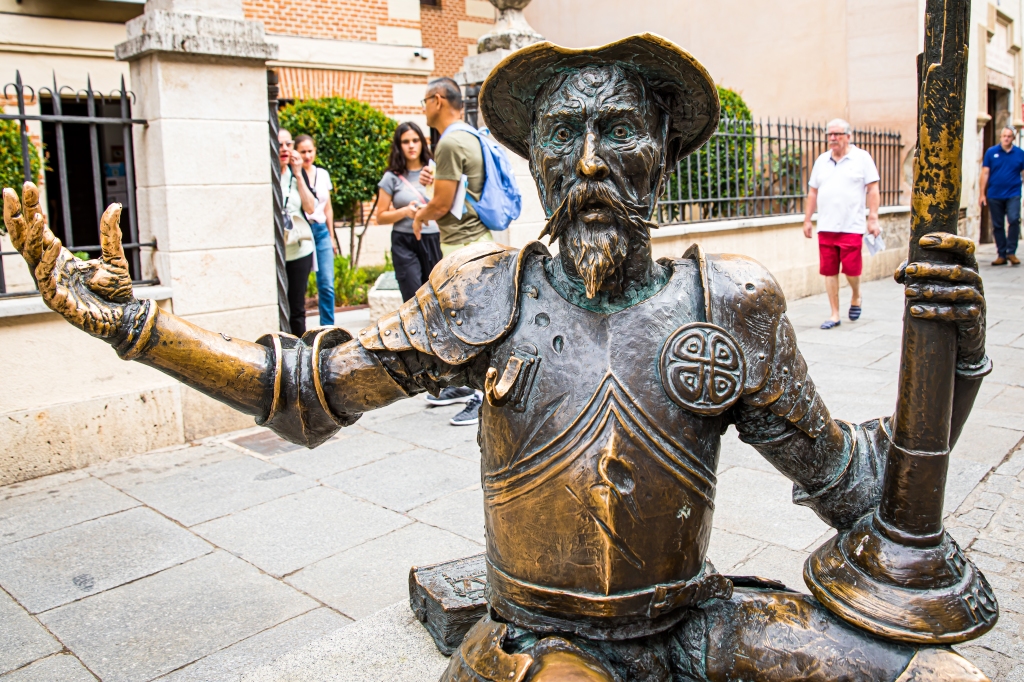I love visiting Spain and Spanish-speaking countries. Ever since spending a year in South America in my early 20s, and acquiring a feel for the language, a small part of my growing up was rooted in hispanic culture. A recent trip to Spain brought introductions to new cities, including Burgos and Alcalá de Henares. The latter visit arose from a longstanding wish to see the birthplace of Spain’s most distinguished writer, Miguel de Cervantes Saavedra. The author of Don Quixote was born there in 1547 and it is where he spent the first four years of his life. Understandably, alongside his former home which is now a museum, the city celebrates its famous author in numerous statues, street names and public institutions. Don Quixote is considered to be the world’s first novel in the modern sense of the word.
Given the date of his birth and the febrile politics of a recently re-conquered Spain, Cervantes was born into a world in which it had been decided that the co-existence of faiths was intolerable. In 1492 the Muslims and Jews who had not converted to Christianity were expelled from Spain. Those who had converted lived amongst neighbours who, very often, sought any sign that the conversion was one of “convenience” and would report people to the authorities. This was the time when the Inquisition was in full force and those who converted were keen to appear compliant. Many years ago, while participating in a canyoning activity north of Almuñécar, in Andalusia, a young instructor accompanying us told me that his surname was the same as the name of a local village. His family’s story was that they had been Jewish and, like many of the converts who remained, they took the name of a local town in order to immerse themselves in Christian Spain and avoid suspicion. Such practices were commonplace.
There is a claim that the family name of Cervantes came from a town of that name in Galicia, and may have been taken for reasons of conversion. However, this is far from certain. The proximity of the Cervantes family’s home to the Jewish quarter of Alcalá de Henares might be a more persuasive argument for some kind of connection. Today, all that indicates the onetime presence of a synagogue and Jewish “coral”, as it was called, is a small plaque. Cervantes senior was a doctor and the family lived both opposite this old Jewish quarter and beside the city’s ancient hospital.

A statue of Don Quixote outside the house in which Cervantes spent the first four years of his life in Alcalá de Henares, near Madrid
Initially, after the Reconquest, the Jewish community experienced relative security compared with other European countries. This did not endure.
“Yet Jews were still better off than their Ashkenazic brethren in the rest of Europe who were expelled from England and France and faced continuing and unrelenting pogroms and persecution in Germany and Central Europe, eventually driving them eastwards to Poland and Lithuania. The Christian rulers of Spain exploited the skills of their Jewish subjects and a thin layer of upper class Jews remained wealthy and influential. The Jewish population of Spain generally still felt comfortable there. After all, they had lived as Spaniards for many centuries. Why should the situation change now?”
The Spanish Expulsion from the Jewish History website accessed 28/06/24
Perhaps the strongest argument that Cervantes had Jewish ancestry comes from evidence internal to Don Quixote. In an excellent BBC World Service edition of The Forum scholars argue that in his novel there is “an implicit cultural critique” which questions, as far as it can, some of the negative narratives about the descendants of Muslims and Jews still living in Spain. In a section of the novel where Don Quixote is in Toledo, he seeks and finds someone to translate a text in Arabic. By showing the continued presence of Hebrew and Arabic speakers in Spain Cervantes put in doubt the official story of a single, homogenous, Christian culture.
Out of the troubled waters of post-reconquest Spain Cervantes created a story capable of finding a broad and appreciative audience. Don Quixote might be seen as a kind of Rosetta Stone, enabling different communities to discern for themselves an intelligible and constructive place in Spanish society. That is no small feat, and the unparalleled significance of Cervantes in Spanish culture bears testimony to his achievement in enabling humour, insight and compassion to leaven the complex experience of living in a society where the past was an ever-present and potent challenge to the present.
“The truth may be stretched thin, but it never breaks, and it always surfaces above lies, as oil floats on water”.
Don Quixote
